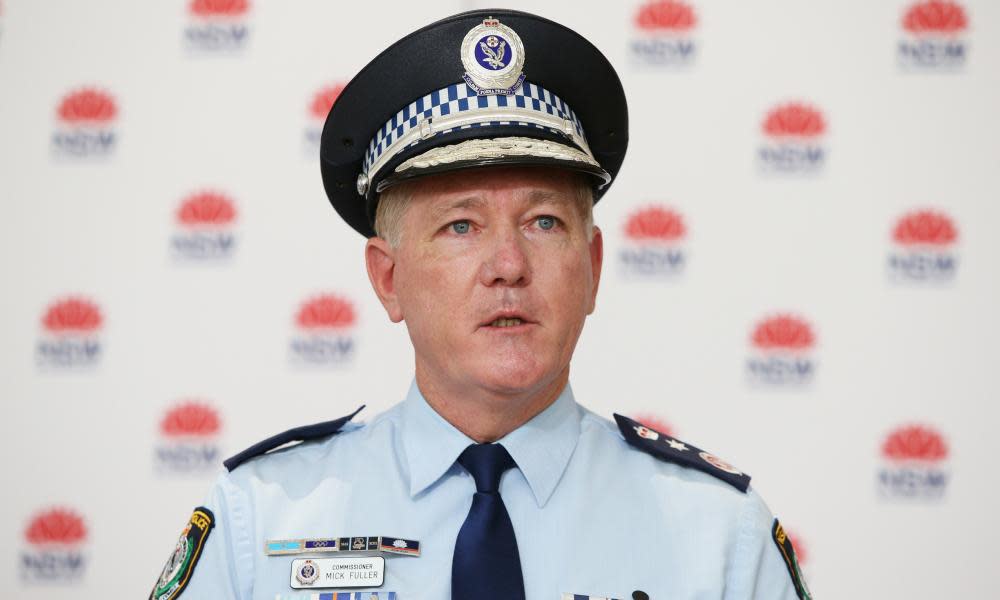Covid case linked to Sydney’s anti-lockdown protest investigated for breaching self-isolation rules

A man who was fined by New South Wales police in the lead-up to last Saturday’s protest later tested positive for Covid-19 and was found to be not isolating at his western Sydney home.
As the NSW police commissioner Mick Fuller warned people not to attend another anti-lockdown protest planned for Sydney on Saturday, police also revealed a case linked to last Saturday’s demonstration was being investigated for a possible breach of self-isolation rules.
Related: Troops enforcing western Sydney lockdown will alienate community, advocates warn
Fuller initially told media on Friday that the 35-year-old from Granville had attended a work site after testing positive for Covid-19, but police later clarified to say the man, while not at his home, had instead been found at another household in Constitution Hill in western Sydney.
Police revealed the man had been stopped at Central station last Saturday as part of a “proactive operation targeting those attending last week’s protest”. The protest saw some 3,500 people gather in Sydney to protest against lockdown rules.
While a police spokeswoman said it was understood the man had been stopped before attending the protest, he was fined $1,000 for being “in breach of the current stay at home orders”.
The man tested positive for Covid-19 the next day, and then, on Friday, was found to not be at his home during a police compliance check.
“This morning, police attended the man’s residence at Granville to conduct a compliance check, where they were initially told the man was at a work site in Parramatta,” police said.
“Subsequent inquiries revealed the man was not at work but was located at a home at Constitution Hill.”
“Investigations are continuing.”
It comes as Fuller told ABC radio on Friday that overseas groups had “absolutely” played a role in organising last Saturday’s protest which led to dozens of people being arrested and hundreds fined after violent clashes with police.
Guardian Australia revealed a German-based conspiracy group helped to drive the anti-lockdown protests.
“Our intelligence agencies through the counter terror unit are reaching out to our Five Eyes partners, we know that extreme left and extreme right groups [were] represented on Saturday,” he said.
Related: NSW Covid update: 170 new cases as army prepares to enforce Sydney lockdown compliance
Fuller said protesters were using “encrypted messaging platforms”, although the protests were largely planned on the messaging site Telegram.
“On Saturday there were some decent people who turned out thinking this [is] a normal protests [but] they were hijacked by these violent thugs, I guess you’d call them,” he said.
Fuller also defended the use of the Australian defence force in western Sydney as part of the attempt to control the city’s Covid outbreak, despite NSW initially rejecting support from the military.
He said ADF personnel would be working on “compliance” with NSW police.
“I understand people are frustrated by any health order but the reality is we’re not winning the fight against this virus,” he said.
He said Saturday’s protesters would be met by more than 1,000 police officers and if the protest was moved to another part of Sydney the police were ready.
Email: sign up for our daily morning briefing newsletter
App: download the free app and never miss the biggest stories, or get our weekend edition for a curated selection of the week's best stories
Social: follow us on YouTube, Facebook, Instagram, Twitter or TikTok
Podcast: listen to our daily episodes on Apple Podcasts, Spotify or search "Full Story" in your favourite app
The NSW premier Gladys Berejiklian warned that people attending could be giving their families a death sentence.
“Can I please warn against anybody taking up illegal activity and protesting tomorrow,” she said. “You could be taking the disease home and passing it on to your parents, your siblings, your brothers and sisters or anybody you might have limited contact with.
“Do not give those you love the most a death sentence.”

 Yahoo News
Yahoo News 
